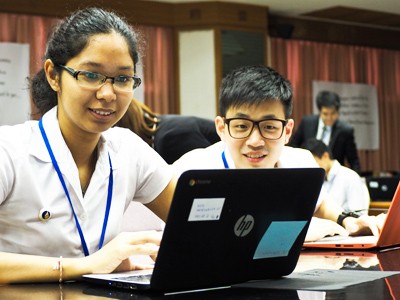Home » News & Information » Press Releases » USAID Leads New Initiative to Expand Job Prospects and Workforce Development in Lower Mekong Countries

Students of Mahidol University's Faculty of Engineering actively participate in the instructor training pilot.
Montakan Tanchaisawat/USAID
For Immediate Release
Wednesday, April 1, 2015
NAKORN PATHOM, Thailand, April 2, 2015 — Students in Southeast Asia may soon have education better tailored to the marketplace under a new training model piloted by the United States Agency for International Development (USAID) in partnership with Google, Inc. It puts businesses in the driver’s seat with university partners in shaping practical education that will enable job-ready graduates to communicate well in a team and meet the needs of industry.
At a three-day training program this week at Mahidol University’s Faculty of Engineering, professors learned how to go beyond theory to use technology and apply workplace scenarios from factories to their courses so students better understand their future work responsibilities.
This training will help the USAID Connecting the Mekong through Education and Training (USAID COMET) project further scale up this approach to other technical colleges and universities in Cambodia, Laos, Myanmar, Thailand and Vietnam to strengthen workforce competitiveness in a range of sectors.
“It’s vital to bridge the gap between the private sector and education institutions to increase the number of youth with the right skills to meet the needs of local employers. This will create new opportunities for youth and help them move their communities and countries forward,” said Michael Yates, director of USAID’s Regional Development Mission for Asia.
This training is part of the U.S. Government’s support for the Lower Mekong Initiative (LMI). USAID COMET will work with more than 100 selected technical colleges and universities in Cambodia, Laos, Myanmar, Thailand and Vietnam over the next five years. The project will focus on communications, teamwork and technical skills related to science, technology, engineering accounting and tourism.
Dutch Mill, a local dairy products company in Thailand, participated in the training by providing real-life scenarios relating to production line efficiency and safety and efficient packaging and distribution. Participants discussed how clear communication among engineers and other employees is key to avoiding problems on the production line.
Hewlett-Packard and Google donated Chromebook laptop computers to the training, which helped the instructors and trainers carry out activities that directly enhance work readiness skills, such as leadership, communications and team collaboration. For example, the students worked on the same document at the same time through Google Docs to build teamwork and IT skills.
According to businesses based in the Association of Southeast Asian Nations (ASEAN) countries, the need for skilled graduates is clear. In a recent USAID study of employers in the Lower Mekong countries (Burma, Cambodia, Laos, Thailand and Vietnam), nearly 80 percent indicated that they are currently looking to hire new staff, most commonly in order to expand the scope of their businesses. However, only 15 percent of the employers surveyed reported that education institutions in these countries are doing a good job in preparing the workforce they need. Surveyed companies identified lack of language skills, teamwork, and technical skills as the three most significant skills gaps in their current workforce.
The study also noted that in Vietnam, an employer commented that students who received high grades in school could fulfill only 50 to 70 percent of the job requirements. In Burma, employers from leading industries including agriculture, fisheries, telecommunications and tourism said about half of new hires needed more training to meet basic job requirements.







Comment
Make a general inquiry or suggest an improvement.